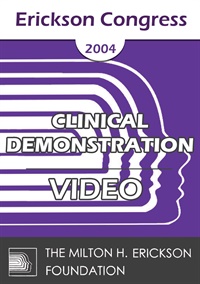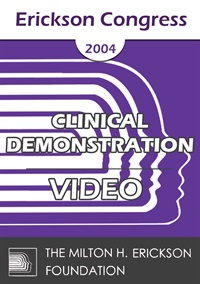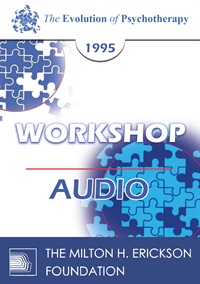
- Average Rating:
- Not yet rated
- Topic Areas:
- Workshops | Psychotherapy | Resistance | Therapeutic Relationship | Therapist Development
- Categories:
- Evolution of Psychotherapy | Evolution of Psychotherapy 1995
- Faculty:
- James Bugental, PhD | David Young, Ph.D. | Molly Sterling, Ph.D.
- Duration:
- 1 Hour 28 Minutes
- Format:
- Audio Only
- Original Program Date:
- Dec 13, 1995
- Short Description:
- The client's task is to try to be open to his/her inner experiencing, disclosing it to the therapist. A client discovers difficulties in doing so, thus disclosing the resistances which are isomorphic with the client's difficulties in life more generally. The therapist's task is to teach and monitor this process.
- Price:
- $15.00 - Base Price
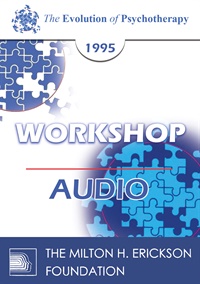
- Average Rating:
- Not yet rated
- Topic Areas:
- Workshops | Psychotherapy | Therapist Development
- Categories:
- Evolution of Psychotherapy | Evolution of Psychotherapy 1995
- Faculty:
- Erving Polster, PhD
- Course Levels:
- Master Degree or Higher in Health-Related Field
- Duration:
- 2:34:09
- Format:
- Audio Only
- Original Program Date:
- Dec 14, 1995
- Short Description:
- The human reflex to summarize and animate experiences is a springboard for the formation of selves. Through lecture and live therapy demonstrations, Dr. Polster will show how to identify the population of selves within and how to restore linkage among them, creating a dependable sense of personal identity.
- Price:
- $15.00 - Base Price
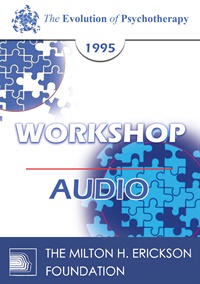
- Average Rating:
- Not yet rated
- Topic Areas:
- Workshops | Psychotherapy | Therapist Development
- Categories:
- Evolution of Psychotherapy | Evolution of Psychotherapy 1995
- Faculty:
- Jeffrey Zeig, PhD
- Course Levels:
- Master Degree or Higher in Health-Related Field
- Duration:
- 2:11:59
- Format:
- Audio Only
- Original Program Date:
- Dec 14, 1995
- Short Description:
- How does one master the practice of psychotherapy? Should training emphasize theory, technique, or research? What about the personal growth of the clinician? We will identify seven essential "postures" through a series of graduated, Psychoaerobics exercises. Attendees will participate in growth games and group hypnosis to explore the merging of discipline and spontaneity that occurs in the most artful and effective clinical work. The program focuses on refining the therapist's lenses (perception), muscles (therapeutic power), heart (compassion), and hat (social role). Educational Objectives: (1) List three therapist postures that were especially well-developed in Erickson. (2) Given a case, describe how to use a Psychoaerobic exercise.
- Price:
- $15.00 - Base Price
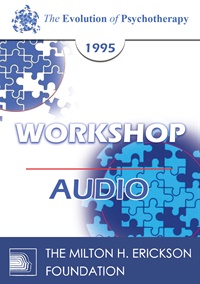
- Average Rating:
- Not yet rated
- Topic Areas:
- Workshops | Psychotherapy | Therapist Development
- Categories:
- Evolution of Psychotherapy | Evolution of Psychotherapy 1995
- Faculty:
- Miriam Polster
- Duration:
- 2 Hours 47 Minutes
- Format:
- Audio Only
- Original Program Date:
- Dec 14, 1995
- Short Description:
- We will address the diversity of awareness in therapy and explore how to use this as an entry and support for therapeutic movement.
- Price:
- $15.00 - Base Price
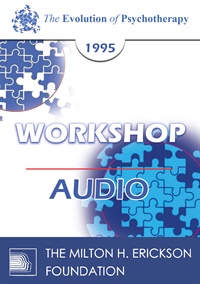
- Average Rating:
- Not yet rated
- Topic Areas:
- Workshops | Family Therapy | Supervision | Therapist Development
- Categories:
- Evolution of Psychotherapy | Evolution of Psychotherapy 1995
- Faculty:
- Salvador Minuchin, MD
- Duration:
- 1 Hour 29 Minutes
- Format:
- Audio Only
- Original Program Date:
- Dec 17, 1995
- Short Description:
- This workshop is a consideration of the need and methods to expand a therapist's available range.
- Price:
- $15.00 - Base Price
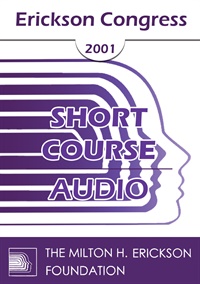
- Average Rating:
- Not yet rated
- Topic Areas:
- Short Courses | Strategic Therapy | Language of Hypnosis | Therapist Development
- Categories:
- Erickson Congress 2001 | Erickson Congress
- Faculty:
- Donald Miretsky, M.Ed
- Duration:
- 1:02:34
- Format:
- Audio Only
- Original Program Date:
- Dec 06, 2001
- Short Description:
- IC01 Short Course 16 - Advanced Strategic Therapy for Beginners: Therapy in the Language Experience of Human Beings - Donald Miretsky, MEd, CPC This short course will teach advanced conceptualization and technique by summarizing it in the language experience of human beings. This means teaching a four-step approach incorporating everyday language, common sense concepts and humor so beginners as well as experienced therapists can learn and apply the skills. This approach is demonstrated by case and video presentation of severely disordered children.
- Price:
- $15.00 - Base Price

- Average Rating:
- Not yet rated
- Topic Areas:
- Workshops | Language of Hypnosis | Therapist Development
- Categories:
- Erickson Congress 2001 | Erickson Congress
- Faculty:
- Norma Barretta, PhD | Phillip Barretta, MA, MFT
- Duration:
- 2:02:34
- Format:
- Audio Only
- Original Program Date:
- Dec 07, 2001
- Short Description:
- IC01 Workshop 26 - Watch Your Tongue: Language is Slippery - Norma Barretta, PhD and Philip Barretta, MA, MFT Many people stumble through life stuck in linguistic traps which imprison them. Language influences outcomes. The words we select in working with patients have a power beyond the wildest imagination. Ambiguity is a most useful linguistic tool. It enables the listener to assign relevant meaning. The Barrettas will demonstrate and have participants experience everal hypnotically useful language patterns.
- Price:
- $15.00 - Base Price
- Average Rating:
- Not yet rated
- Topic Areas:
- Clinical Demonstrations | Psychotherapy | Therapist Development
- Categories:
- Erickson Congress | Erickson Congress 2004
- Faculty:
- Danie Beaulieu, PhD
- Course Levels:
- Master Degree or Higher in Health-Related Field
- Duration:
- 59:24
- Format:
- Audio and Video
- Original Program Date:
- Dec 03, 2004
- Short Description:
- To name five new visual techniques. To name two techniques engaging the body during the therapeutic process.
- Price:
-
Sale is $29.00
price reduced from Base Price - $59.00
- Average Rating:
- Not yet rated
- Topic Areas:
- Clinical Demonstrations | Psychotherapy | Therapist Development
- Categories:
- Erickson Congress | Erickson Congress 2004
- Faculty:
- Betty Alice Erickson, MS, LPC, LMFT
- Course Levels:
- Master Degree or Higher in Health-Related Field
- Duration:
- 55:48
- Format:
- Audio and Video
- Original Program Date:
- Dec 03, 2004
- Short Description:
- To list three ways of incorporating client concerns within therapy. To describe the concept of therapist flexibility.
- Price:
-
Sale is $29.00
price reduced from Base Price - $59.00
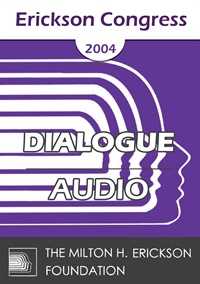
- Average Rating:
- Not yet rated
- Topic Areas:
- Dialogues | Humor | Therapist Development
- Categories:
- Erickson Congress | Erickson Congress 2004
- Faculty:
- Betty Alice Erickson, MS, LPC, LMFT | Bernhard Trenkle, Dipl. Psych
- Duration:
- 1:03:51
- Format:
- Audio Only
- Original Program Date:
- Dec 03, 2004
- Short Description:
- IC04 Dialogue 04 - Humor - Betty Alice Erickson, M.S., Bernhard Trenkle, Dipl. Psych.
- Price:
- $15.00 - Base Price
Tags: Humor Therapist Development
Please wait ...


